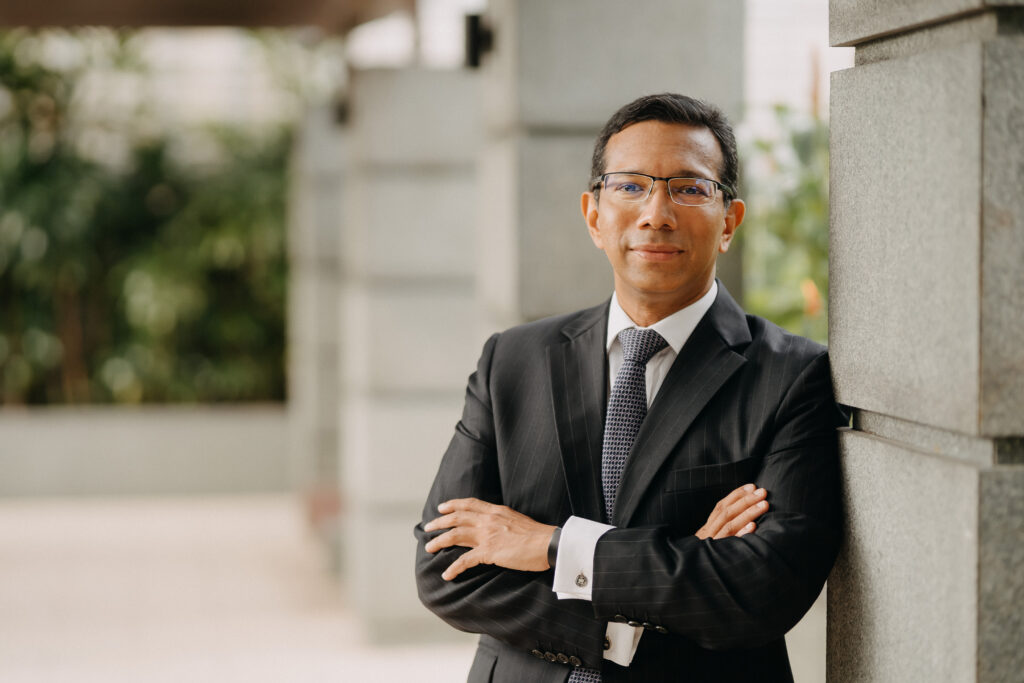Meet the Founder of The ENT Clinic Singapore –Dr Jeeve.

Q: What inspired you to be an ear, nose and throat (ENT) specialist?
I found ENT very interesting as a medical student in Oxford. The ENT Department at the Radcliffe Infirmary had many inspiring ENT Consultants.
ENT is both a medical and a surgical specialty. Many treatments for ENT issues do not involve surgery, so one feels like a physician and a surgeon! I also found head and neck anatomy very fascinating as a student – the 12 cranial nerves that course through the head and neck from the brain control so many vital functions.
Q: What inspired you to start The ENT clinic Singapore?
I started The ENT Clinic in 2015 as a solo practitioner but my aim was to build a group practice. Working in a silo is bad for the patient, and lonely for the surgeon! Having colleagues allows us to tap each other’s clinical knowledge and skills. We also cover for each other when we are away ensuring that patients are cared for in our absences. As the group has grown, we have been able to provide more comprehensive services for patients.
Q What is the philosophy behind patient care at The ENT Clinic?
Patients should have full autonomy over their care. We believe our role is to listen well, diagnose accurately and then offer patients as much information as possible to help them decide on the best treatment options. We also believe that lifestyle and dietary modification should be central to patient care. Symptom relief is important but so is addressing the root cause of conditions.
Q Can you share a little about your educational background and training?
I grew up in Malaysia and did most of my primary and secondary education there. I completed A levels in the UK on a scholarship from the Tunku Abdul Rahman Foundation and then studied pre-clinical medicine in Cambridge University as a Chevening Scholar (then called the British High Commissioner’s Award).
It was possible then to do the first three years of medical school in Cambridge and leave for another medical school. I chose to move to Oxford and obtained my medical degree there. Following graduation, I spent 11 years working and training in the National Health Service, and completed my ENT training in London. I spent a year in Brisbane, Australia as a Fellow – a common undertaking by surgeons who have completed all their training – and then took up a position in Singapore’s Tan Tock Seng Hospital in 2008.
Q What advancements in ENT care are you excited about?
Advances in surgical techniques, medical devices and implants, and innovative treatments abound. In ENT, the management of allergy, nose and sinus issues has undergone a recent revolution with the introduction of novel treatments such as allergen immunotherapy and the use of biologics. As artificial intelligence ramps up our ability to characterise human proteins that are key in disease conditions, I anticipate more novel treatments to come available for a variety of ENT conditions e.g. gene therapy for congenital hearing loss
Q What is a memorable moment in your career?
Probably the day I passed the Intercollegiate Exams (aged 35!) and was awarded the Fellowship of the Royal College of Surgeons of England. Culmination of 10 years of medical training! The icing on the cake was being told the following day that I was also awarded the Gold Medal for my performance.
Q: How do you unwind after a long day at the clinic?
I find jogging or time in the gym is the best way to unwind. But I will admit that Netflix or watching English Premier League football is sometimes easier!
Q: What is the one piece of advice you give to someone experiencing ENT issues?
Seek early medical attention either from your GP or ENT Specialist. Don’t rely on “Dr Google” and self-medicate! Avoid prolonged use of over-the-counter remedies – some can be harmful e.g. nasal decongestant sprays. Some conditions such as sudden hearing loss needs immediate attention or may be irreversible.
Q: What advice would you give to someone considering a career in medicine?
Medicine is a long and demanding career. It is impossible to have a clear idea of what it entails even if you do observerships. Speak to as many doctors and do read books such as This Is Going to Hurt by Adam Kay, Being Mortal by Atul Gawande, Bad Science by Ben Goldacre, Do No Harm by Henry Marsh, and The House of God by Samuel Shem – just a few to get you started!
Q: Can you share a fun fact about the ear, nose, or throat that most people don’t know?
The smallest bones in your body are in your ear and they do not grow after birth.
Dr Jeeve is an ENT specialist based in Singapore
Share this blog via:
